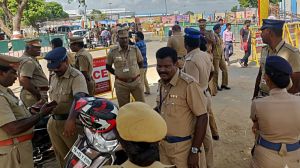Polling and peace-making
Despite some threatened turbulence, it is on the cards that the turnout in the Nagaland polls today...

Despite some threatened turbulence, it is on the cards that the turnout in the Nagaland polls today, March 5, will be high, though possibly not as much as the 85 per cent estimated in Tripura, another disturbed state. What this could imply is that, all said, the people would like to see a peaceful means of resolving issues. Equally, the more than decade-old ceasefire in Nagaland has seen many breaches but suggests an alternative to the gun. Marry the two and there is hope that things may be slowly changing in India8217;s troubled Northeast, though there could still be a long way to go.
The Naga uprising is, of course, the oldest and most stubborn conflict. Its present phase is manifest in Manipur, and to some extent in the Tirap division of Arunachal and in Karbi Anglong in Assam where there have been efforts to consolidate the influence of the National Socialist Council of Nagaland NSCN. Nevertheless, the latest extension of the NSCN Isak-Muivah I-M ceasefire by another year is clear indication that the peace process has not been derailed. It will probably pick up momentum once the electoral dust settles. The more germane issue is the continuing inability of various Naga factions to achieve internal reconciliation.
Negotiations with the IM group have over the years led to recognition by the government of the Naga peoples8217; 8216;unique history8217; as a basis for further discussion. Sovereignty is not now being strongly canvassed and talks have moved towards exploring whether these 8216;unique8217; features can find constitutional expression through a possible amendment of the Indian Constitution providing for large devolution, and incorporation of other features in a Naga Constitution that has an organic link with the Indian Constitution. The J038;K Constitution is not the only precedent. A remodelled Sixth Schedule devised to accommodate Naga aspirations or the wider Panchayat Extension to Scheduled Areas PESA Act 1996, point to other variants that can serve such a purpose without derogating from national unity and integrity. The issue of Nagalim or unification of all Naga inhabited areas need not constitute an insuperable obstacle if non-territorial solutions are sought.
These are eminently practicable and have worked elsewhere. Assam has provided for apex councils on a non-territorial basis for some half a dozen small and scattered plains tribals such as the Tiwas, Rabhas, Mishings, Sonowals and Deoris. These models can be developed and adapted to provide innovative solutions for what earlier seemed impossible situations. The peace and development thrust of the PM8217;s new Northeast policy holds out much promise.
It would be unwise to assume that development can be a panacea for all ills. At the same time, the people of the Northeast have been long handicapped by lack of connectivity and infrastructure to match the modernising aspirations of simple communities traumatised by Partition and sudden integration. They must manage multiple transitions as they move from a subsistence-barter economy to a monetised, market system with global links. The opportunities thrown up will influence older mindsets provided the process enables the people to assume ownership of these schemes.
Nagaland8217;s successful communitisation programme in elementary education, primary health and retail electricity distribution exemplifies how this can work. Likewise, NEPED, the Nagaland Environment Programme for Economic Development, has led the way in upgrading traditional jhum cultivation with tree farming in the emerging circumstances of a steadily shrinking jhum cycle on account of relentless population pressure. Naga youth, like others in the region and the country, are increasingly anxious to improve on their education and to acquire the knowledge and skills that will equip them to avail of tantalising professional, technical and other market opportunities. Many are thus gradually and unconsciously beginning to redefine the meaning and purpose of self-determination. The zest with which the elections have been contested may not be totally unrelated to changing mindsets that augur well for the future.
The writer is a former editor of the Indian Express
- 01
- 02
- 03
- 04
- 05































